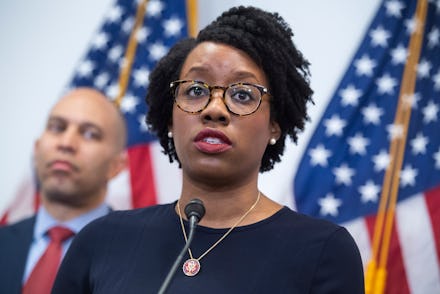The "Momnibus Act" seeks to address Black maternal mortality, finally

This time last year, Sen. Cory Booker (D-N.J.) and Reps. Lauren Underwood (D-Ill.) and Alma Adams (D-N.C.) introduced a slate of legislative proposals aimed at mitigating the Black maternal mortality crisis in the U.S. But between the presidential election, the Trump administration's priorities, and the coronavirus crisis, the legislation never got called for a vote.
This year, the trio is introducing the bill again, energized by the newly-secured Democratic control of the House of Representatives, Senate, and of course White House. Vice President Kamala Harris co-sponsored the 2020 version of the legislation while she was serving as a senator for California.
The Black Maternal Health Momnibus Act of 2021 is a set of 12 proposals that address the cause and harmful effects of the lack of Black maternal care in the country. ("Momnibus" is a play on the word "omnibus," the term for a single document that includes many distinct legislative proposals.) The bill attempts to address the longstanding economic and political disinvestment in Black birthing people by pushing for increased investment in several areas, including housing, transportation, nutrition, and telehealth. Systemic disinvestment in public systems like health care and education has resulted in a Black maternal mortality rate that's three to four times higher than it is for white people.
Critically, a majority of these deaths are preventable with training, access to adequate health care throughout pregnancy, and intentional efforts to address racism within American medicine.
"During COVID-19, we've seen Black, Hispanic, Indigenous, and Asian Americans face higher rates of exposure to the virus and suffer more severe health consequences upon infection. These disparities are unacceptable," Underwood said during a digital press conference, per The Hill. "The hour for bold action has arrived and bold action is what the momnibus represents."
The three elected officials championing the legislation point to how the combined harms of both the COVID-19 crisis and the Black maternal care crisis have been created and perpetuated by our existing racist social and economic systems. "Or maybe better put," Booker said, "They are the result of us failing to make policy choices that would help us to affirm who we say we are — a nation that believes that people have inalienable rights."
Underwood, a Black woman and a registered nurse, and has seen firsthand the racism embedded within the U.S. medical and health care systems. "During our clinical training we were taught that there's 'something about Black women,' where we're more likely to die as a result of pregnancy or labor or related complications," Underwood said. "That is the wrong message to be sending as part of clinical training for our health care providers."
The bill is wide-ranging and includes care and support for incarcerated parents. It also specifically mentions the untold consequences COVID-19 will have on pregnancy and post-partum health care. "It is my goal to have at least some provisions signed into law this year, and so we are working with that sense of purpose and urgency and laying the groundwork to make sure that leadership is well aware that these bills are coming their way," Underwood said.